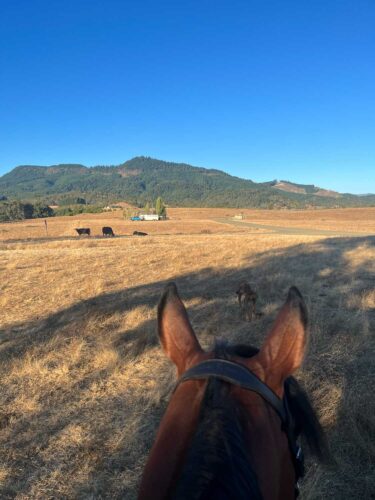
Fifty-two miles south of Eugene, Mildred Kanipe Memorial Park’s unique history inspires Douglas County and local volunteers to support her legacy by fulfilling its namesake’s wish of keeping her land public and protected.
Mildred Kanipe Memorial Park is just under 1,110 acres of space to hike, trail ride, camp, picnic and bird watch. Peacocks yowl like cats, and cattle roam the property.
Mildred Kanipe was born in 1907. Growing up, she loved helping her father with chores around their ranch. In 1949, Kanipe purchased 633 acres, connecting the 167 acres she purchased when she was a young adult and the 290 acres she inherited from her father when he died in 1940. Kanipe never married. Instead, she raised cattle, sheep, goats, rabbits and chickens on her beloved property, running the ranch independently, which was unusual for a woman during that time.
When Kanipe died in 1983, she left her 1,100 acre property to Douglas County to be used as a public park and requested that it be named after her. Douglas County and volunteers keep her legacy alive, restoring structures, keeping-up the land and protecting it from logging, as Kanipe wished.
In 2005, local admirers of Kanipe and her ranch formed a volunteer organization, Friends of Mildred Kanipe Memorial Park, to assist Douglas County in maintaining the park and keeping it open to the public. It created a website with information about Kanipe’s and the ranch’s history, ways to enjoy the space and keep track of events at the park, including bird hunting, wildflower walks and orchard tours.
Karen Roberson, an original Friends of Mildred Kanipe Memorial Park board member, grew up on the farm next to Kanipe’s. Roberson remembers seeing Kanipe working hard on the property and driving around in her truck wearing jeans and an aviator hat. In her will, Kanipe requested she be buried in her overalls.
“I’m sure it was lonely, you know, being a woman running a ranch,” Roberson says.
Sometimes, Kanipe would stand at the fence where their properties met and wait for Roberson’s mother to invite her in for coffee. On holidays, Roberson’s mother would send her to deliver a pie to Kanipe’s mailbox.
Kanipe left all her belongings to the county, so when she died, everything went to the Douglas County Museum. Years later Roberson came across Kanipe’s writings. She wrote beautifully about being a landowner, Roberson says. It expanded her view of Kanipe as a “rancher woman running around in her overalls and dirty rubber” who she would see with her animals at the local farm auctions.
“I wish I had known that about her when I knew her as a person,” Roberson says. “I feel sad that I didn’t know that part of her.”
Kanipe’s land originally belonged to the Yoncalla, a tribe of Kalapuya Native Americans, until 1856 when it was relocated to the Grand Ronde Reservation after the ratification of a treaty that surrendered its land to the United States.
Kanipe’s grandparents bought 650 acres of the land in the 1870s from settlers who acquired it through the Donation Land Claim act of 1850. The act entitled “certain white settlers and Indians of mixed blood in Oregon Territory,” according to the Oregon Secretary of State.
The park includes 14 miles of trails for hiking and horseback riding, a Douglas fir old-growth forest and oak woodlands. Kanipe’s house still stands in the “day use” area of the park, along with two of the three original barns on the property, a pond and picnic benches. The campground at the park has 14 equine and five regular campsites.
Debra Gray is another original Friends of Mildred Kanipe board member. She also knew of Kanipe while growing up in nearby Oakland, Oregon. Later, when she was working in Cody, Wyoming, in 1982, she came across an article about Kanipe in Ms. Magazine by Teresa Jordon, author of Cowgirls: Women of the American West. Kanipe was eccentric and ahead of her time, taking care of a ranch independently, something not many women did at the time, Gray says. She also ran a grade-A dairy for eight years.
Many of Kanipe’s writings were about her love and admiration for trees.
Her will stipulated that the trees on her property were not to be cut and harvested unless necessary to fund the maintenance and improvement of the park.
“I feel that the land is a sacred trust and we should hold it dear. That we should take care of it; should protect and preserve it; should enhance its productivity and its beauty as much as we can and above all we should love the land, which I surely do,” Kanipe said in 1974 while accepting the Century Farm Certificate, an award acknowledging long-term family-owned farms.
In 2014, Douglas County decided to build campgrounds to financially support the park. The county planned to harvest timber from the memorial park to finance the remaining $65,000 project costs. Friends of Mildred Kanipe proposed raising the money instead. The county gave it six months, but it only took three for it to reach its goal.
It’s been 42 years since Kanipe died, and many of her requests remain fulfilled. Kanipe’s legacy lives on at Mildred Kanipe Memorial Park the way she hoped.
Learn more about Mildred Kanipe Memorial Park at MildredKanipePark.org and on Facebook at Friends of Mildred Kanipe Memorial Park. Reserve a campsite by finding Mildred Kanipe at Travel.camping.com. Visit Douglas County Museum at 123 Museum Drive in Roseburg or online at UmpquaValleyMuseums.org.